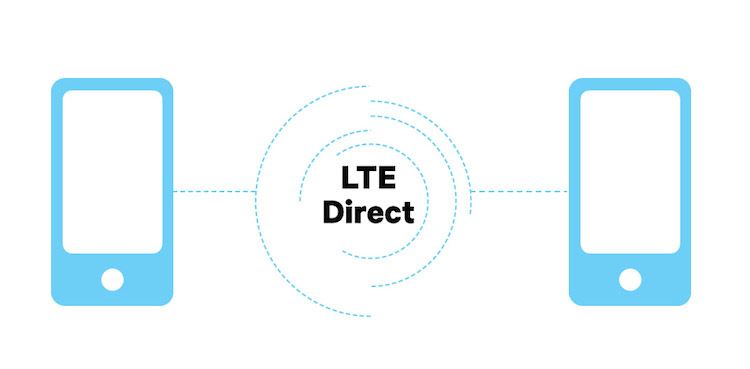LTE Direct: communication without base stations

Qualcomm, Facebook and a number of other IT companies are experimenting with technology that will allow smartphones to use their LTE module for direct communication with other devices at a distance of up to 500 meters.
A new feature added to the LTE protocol allows the possibility of communication between two subscribers bypassing base stations. Phones will be able to "talk" directly with other mobile devices and exchange information with beacons located in stores and other trade enterprises.
Known as LTE Direct, this wireless technology has a range of 500 meters, which is much more widespread Wi-Fi and Bluetooth. It is included in the LTE standard update, which will be adopted this year. Devices supporting LTE Direct may appear no earlier than the end of 2015.
LTE Direct was proposed by Qualcomm, which has been working on the new technology for about 7 years. At a Uplinq conference in San Francisco, company representatives announced that Facebook and Yahoo, already experimenting with the technology, are among the partners supporting the venture.
Among other applications, LTE Direct, for example, is tested for the possibility of using, for automatic detection of nearby people, organizations, and other information in accordance with specified criteria. Some see technology as a promising new channel for targeted advertising.
Despite the considerable working distance, LTE Direct consumes a relatively small amount of energy, so the phone can constantly monitor devices nearby, without much damage to the charge of the mobile battery. A device with LTE Direct enabled will be able to detect other phones using technology or by exchanging information with beacons - stationary devices installed on the territory of organizations or which are part of the infrastructure of airports or railway stations.
“You can treat LTE Direct as the sixth sense that always knows what's happening next to you,” says Mahesh Makhijani, Qualcomm's Technical Director of Marketing. “The world around us is filled with information and the phone can use this opportunity to help you in your daily life.”
Beacons using LTE Direct will be able to transmit useful information, as well as, for example, special offers. Such a device, mounted in the check-in counter, will be able to inform people nearby who have bought a ticket for a delayed flight.
Facebook is looking for ways to use the technology in its own mobile application: “LTE Direct will allow us to build an experience of interaction around pleasant interactions with local organizations or friends who are nearby,” said Jay Parikh, vice president of engineering infrastructure at Facebook. “You can find information about events or create them yourself without preparation.”
LTE Direct can be used in the same scenarios as iBeacon, announced by Apple last year. Retailers, including Macy's, for example, are testing iBeacon's capabilities to track and connect customers’s mobile devices. However, the technology proposed by Apple uses the Bluetooth protocol - its range is small, and not all users leave the Bluetooth module turned on.
According to Beverly Harrison, lead scientist at Yahoo Labs, his company has begun developing applications that can use LTE Direct. One of the applications of this kind is a digital guide: it’s enough to tell him how much free time you have so that the application offers you a route that goes along with points of interests that are compiled on the basis of online information about them obtained using LTE Direct. Testing the application is scheduled to begin in January.
LTE Direct is also designed to smooth out failures in the cellular network that occur when an influx of subscribers trying to connect to the same base station. New York-based advertising agency R / GA, with Nike and Beats among its customers, is developing a system that will enable LTE Direct to serve millions of people in Times Square and its surroundings on New Year's Eve. According to Roman Kalantari, creative director of R / GA, LTE Direct is the only technology that will allow subscribers to stay online in such conditions.
RG / A and Control Group technology consultant also plan to use LTE Direct for targeted advertising. Using a new technology, the smartphone will be able to transmit information about which food or products the user prefers, which will quickly prepare a personal proposal: “The idea that every retailer can track the intention to buy something is incredibly valuable,” says Calantari.
In theory, LTE Direct could be used to create communication applications that redirect information from device to device. Some instant messengers can already use Wi-Fi or Bluetooth to communicate with nearby subscribers. But LTE Direct will be able to increase the working radius and expand the capabilities of such applications. However, carriers will be able to track which of the devices on their network can use LTE Direct, because this technology uses the same radio frequency band as conventional cellular channels. According to Qualcomm, operators can even get a new source of revenue by serving companies that want to offer services or applications that use the new technology.
The original article about LTE Direct is here .
